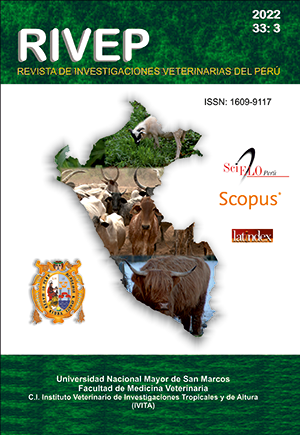Mentha piperita extract increases survival of Litopenaeus vannamei shrimp experimentally infected with Vibrio spp
DOI:
https://doi.org/10.15381/rivep.v33i3.21178Keywords:
shrimp, mortality, alternative treatment, phytobiotic, mint, antibioticAbstract
The most important bacterial diseases in Litopenaeus vannamei farming are vibriosis caused by Vibrio spp, which are usually treated with oxytetracycline (OTH). Plant extracts are an alternative for its treatment. The study aimed to determine the effect of three extracts of peppermint (Mentha piperita) on the survival of shrimp experimentally infected with Vibrio spp. Three mint extracts were prepared: ethanolic in a water bath (EBM), in olive oil in a water bath (ABM) and macerated in olive oil (MA). Twenty strains of Vibrio spp were isolated from farmed shrimp and it was performed an in vitro assay for their sensitivity to three doses of the extracts (10, 15 and 20 µl). An in vivo trial was carried out for 16 days with 180 shrimp of 4.5 g infected by immersion with 105 CFU/ml of Vibrio spp strains in three treatments: 1) feed with EBM, 2) with 3‰ OTH and 3) without those additives. The survival rate, growth and load of Vibrio spp in the hepatopancreas were evaluated. It was determined that in vitro, the three types of extracts were able to inhibit Vibrio spp, with 20 µl of EBM being the one with the greatest inhibition, although its power was lower than that of OTH (diameter of the inhibition halo equivalent to 58.2% of that of OTH). In the in vivo assay, EBM showed to be as efficient as OTH in increasing survival rate and growth in weight, as well as in reducing the load of Vibrio spp in the hepatopancreas of infected shrimp (p<0.05). It was concluded that EBM is an alternative as efficient as oxytetracycline to increase the survival of shrimp infected with Vibrio spp.
Downloads
Downloads
Published
Issue
Section
License
Copyright (c) 2022 Gianmarco Mendoza Noblecilla, Alberto Ordinola-Zapata

This work is licensed under a Creative Commons Attribution 4.0 International License.
AUTHORS RETAIN THEIR RIGHTS:
a. Authors retain their trade mark rights and patent, and also on any process or procedure described in the article.
b. Authors retain their right to share, copy, distribute, perform and publicly communicate their article (eg, to place their article in an institutional repository or publish it in a book), with an acknowledgment of its initial publication in the Revista de Investigaciones Veterinarias del Perú (RIVEP).
c. Authors retain theirs right to make a subsequent publication of their work, to use the article or any part thereof (eg a compilation of his papers, lecture notes, thesis, or a book), always indicating the source of publication (the originator of the work, journal, volume, number and date).










